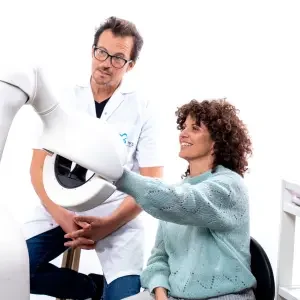Meet the robotic system that can shorten stroke rehabilitation by up to 50%

The Jerusalem Post has partnered with ExitValley, a digital platform that enables anyone to invest in Israel’s startup ecosystem and share in its success. In this article, we are pleased to introduce BioXtreme, an Israeli company that helps shorten upper post-stroke limb rehabilitation using innovative robotic technology.
Millions of people worldwide suffer strokes or other brain injuries each year, requiring a long and expensive rehabilitation process. BioXtreme will assist in significantly improving their quality of life while shortening the recovery process and greatly improving motor skills.
BioXtreme has developed deXtreme™, a groundbreaking robotic system for patients recovering from stroke or other traumatic brain injuries that applies motor error enhancement forces in a combined virtual environment to restore motor learning and rehabilitate upper limbs. The device features an array of sensors, controllers and motors powered by unique algorithms.
“While all traditional rehabilitation methods that aim to correct the patient’s motor error using cognition require long rehabilitation time and allow only limited success,” says company CEO Haim Hoffman, “BioXtreme’s solution relies on error enhancement technology, in a method that causes the body’s adaptive response to correct its movement intuitively and automatically. After just a short number of treatments, the correct movement is embedded in the brain and learned by the patient, bypassing cognition”.
The company’s unique patented error enhancement technology will shorten rehabilitation time by up to 50% and improve the range of motion by 100%, compared to traditional rehabilitation methods, as shown in three clinical trials and an independent research study conducted by Northwestern University in the United States.
“The robot detects the patient’s error versus the correct trajectory and intensity of movement, with sensors embedded in the robotic platform,” Hoffman explains. “Then, this error is fed to the control system, which calculates the direction and intensity of the required error enhancement, and sends commands to 3 axis motors (Z, Y, X) which perform the error enhancement.
“Applying the error enhancement to the limb triggers the body’s adaptive response,” he adds, “which causes it to instinctively and automatically correct the movement to or near the right direction. The system, using machine learning and AI, learns the required error enhancement each time and adjusts it to the patient’s progress during each repetition, which makes practice sessions more effective. Within 10-12 training sessions, the correct movement is embedded into the patient’s brain and becomes a habit.”
Thus far, BioXtreme has received investments from the Israeli Innovation Authority (Chief Scientist), the Ashkelon Technological Industries tech incubator and Gefen Biomed Investments Ltd, its parent company, as well as from Netherlands -based Lucio Fontana BV, the company’s leading strategic investor who owns large companies providing medical and para-medical services to the Dutch health system, including ownership of hospitals.
The company is in contact with leading hospitals in Israel and around the world who have expressed great interest in its unique neurotherapy and technology, and have asked to take part in the product’s demonstration. The company has also signed contracts with large US and European distributors, along with other cooperation agreements signed throughout Europe.
“For us, what we do is not just for profit, but for the benefit of all mankind,” says Hoffman. “Because of the limitations in hospitals, manpower and lack of space, stroke patients return home when they are partially rehabilitated and become dependent on their families and their community. When they are rehabilitated and are able to move, we are bringing them back to the family circle, to the community and to work. Of course, there are also economic elements. There is a huge market of $300 billion per year, and the possibilities for entering this market are almost limitless.”
The company’s intellectual property is protected by an extensive patent which is registered and approved in the US, Europe and Israel and includes a combination of unique hardware (sensors, controllers and motors), with the company’s error enhancement technology, as well as unique algorithms for calculating and amplifying the error, with automatic calibration, machine learning capabilities, and all care-related data gathered via the cloud.
The patent registration has been extended to Russia and China through Utility Model, and the company later intends to expand it to further territories and register additional patents for its next products.
